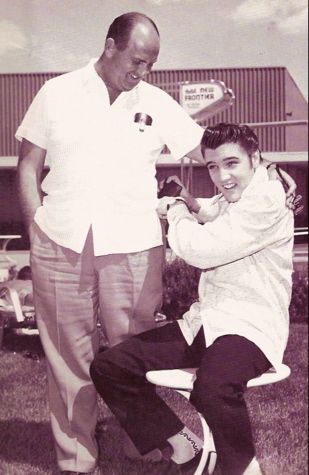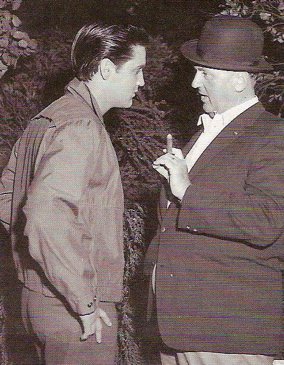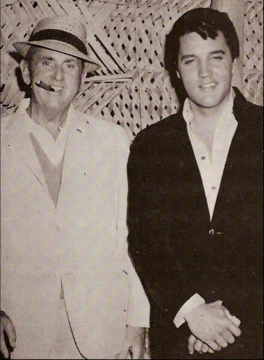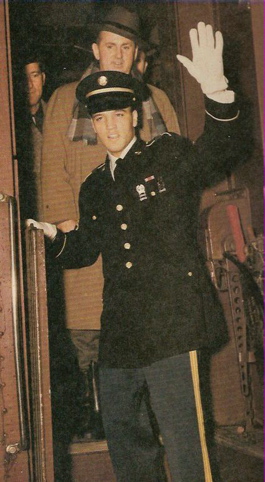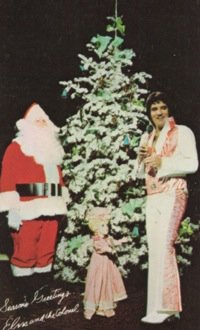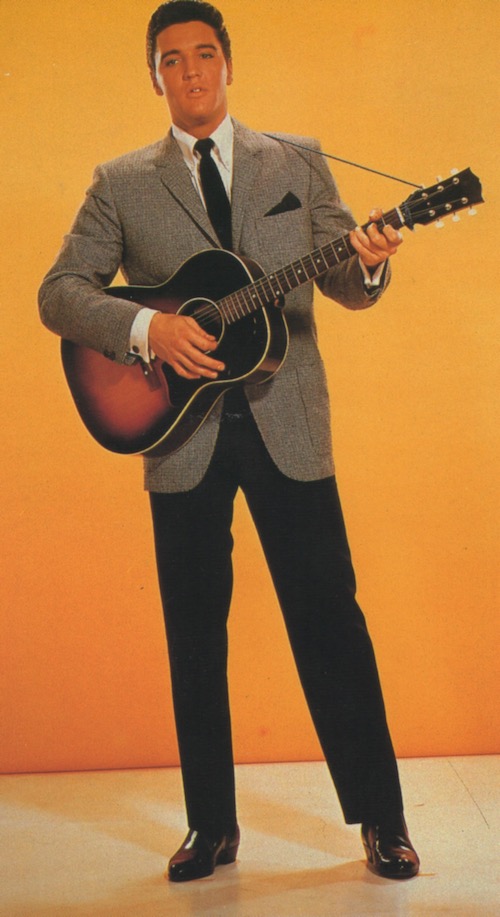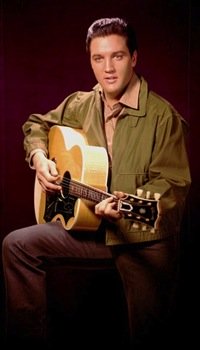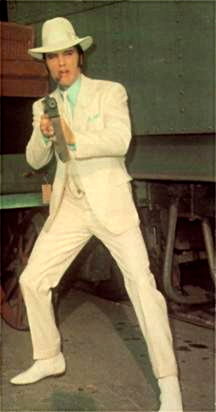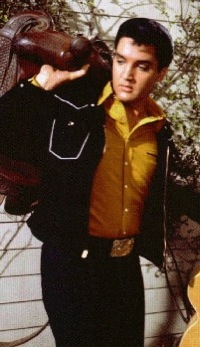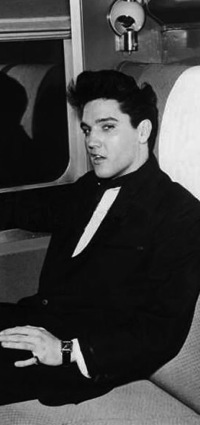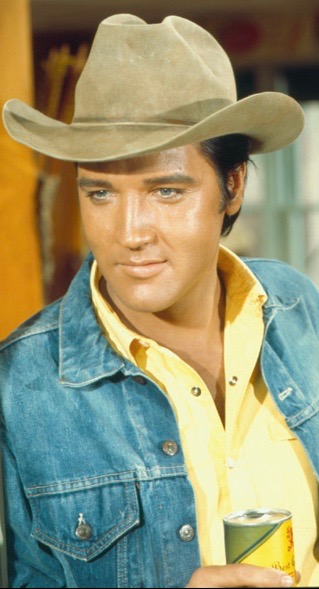Elvis History Blog
The Truth About Elvis Presley's Controversial Hollywood Career
“I’m not necessarily running down Colonel Parker, because he’s handled Elvis extremely well because Elvis is such a successful star, but he has not handled Elvis well as far as being an acting star. Elvis is kind of a joke in the industry as an actor.”
- Don Siegel (1971)
Siegel, the director of Elvis’ 1960 dramatic film, Flaming Star, blamed Presley’s disappointing acting career on the star’s manager, who negotiated the 14 studio contracts that guided his client’s work in Hollywood from 1956-1969. While also allowing that Elvis could have taken his acting work more seriously, Siegel felt Presley had no opportunity to develop into a good dramatic actor as long as he was “under the Machiavellian influence of Colonel Parker.” Siegel’s assessment is the commonly accepted view for why Elvis’ Hollywood career evolved the way it did. However, a closer look at the personalities and the choices made during those years reveal that the direction of Presley’s career can’t be attributed in its entirety to Parker’s mismanagement.
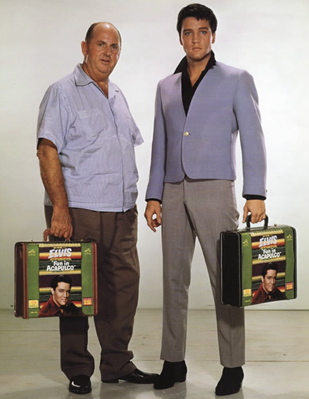
While Parker and Presley were the main characters in the story, there were other significant players. Producer Hal Wallis, in particular, played a major role. Ultimately, though, the American movie-going public had the final say on what kind of films Elvis made.
In the beginning, Elvis clearly and repeatedly stated his desire to be a serious actor. In 1956 he told Wallis, “My ambition has always been to become a motion picture actor — a good one, sir.” And later he declared, “I want to be the kind of actor that stays around for a long time.” Of course, he got his wish, but not as the versatile dramatic actor he envisioned, but as a typecast musical comedy performer.
• The Colonel was a quick study in Hollywood
While he was certainly a wily and effective veteran of the music industry by 1956, Colonel Parker then was just a neophyte when it came to the ways of negotiating with Hollywood film moguls. His first contract with Wallis at Paramount testifies to that — only $15,000 for Elvis, no script approval, no profit sharing, no extras at all.
Parker, however, learned quickly. When Wallis failed to find an appropriate script for Elvis’ first movie in 1956, the Colonel exercised his contractual right to take Elvis to another studio. When he got Presley $100,000 from 20th Century Fox for Love Me Tender, Parker realized immediately that he could play the studios against each other to maximize Elvis’ salary in future contracts.
While Elvis had no interest in business dealings, then or ever, by all accounts Colonel Parker reveled in them. In her 2003 biography of Parker, Alanna Nash asserted, “Through Hollywood, Parker, [then] forty-six years old, would also make himself powerful — more omnipotent, even than the old-line tycoons. His aim was not only to become a figure of respect, but also to build his own legend.” When the team of Martin and Lewis broke up, Hal Wallis needed a replacement act at Paramount that appealed to young people. After seeing Elvis on TV early in 1956, the producer knew the rock ’n’ roller was just what he needed. Signing Elvis to a movie contract brought Wallis up against Parker, a contentious negotiator the likes of which the producer had never come across.
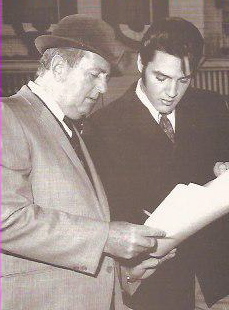
“He’s an obnoxious, terrible man”
In Wallis, Parker saw the ultimate example of a successful, powerful Hollywood mogul. According to Nash, the Colonel’s ego dictated a confrontational relationship. “It would not be enough for Parker to be accepted as an equal by such men. He would have to needle them, bully them, and prove his superiority with whatever means necessary, including chicanery, deceit, and cunning.”
Nash’s interpretation is debatable, of course, but there is no doubt that Wallis found the Colonel a disagreeable adversary. In a memo, the producer “vowed he’d rather try to close a deal with the devil,” and Wallis’ partner, Joseph Hazen, declared of Parker, “I wouldn’t be a hundred feet away from him. He’s an obnoxious, terrible man.”
The upshot was that Parker saw contract negotiations as a competition between him and the studios. The Colonel could win by wringing maximum concessions from his opponents, and those concessions could best be measured in dollar signs. Elvis’ artistic desires appeared secondary to the Colonel’s ego during negotiations. At the very least, Parker had a conflict of interest in representing Presley — his own interests had the potential to conflict with his client’s interests.
The apparent reason Parker ignored Elvis’ goal of becoming a dramatic actor is that the Colonel didn’t believe his client had the talent to achieve that goal. Byron Raphael, a long-time Parker assistant, stated that, “the only criticism I ever heard the Colonel make of Elvis was about his acting. He never believed that Elvis was going to be an actor. Not for a second.”
In a 1964 Variety article, the Colonel related an anecdote, probably fictitious, that illustrated his lack of faith in Elvis’ acting ability. “Another guy says he has a script which would clinch an Oscar for Elvis and wouldn’t we do it for less money. I told him pay us our regular fee and if Elvis gets the Oscar, we’ll give him his money back. We never saw him again. So maybe we never win an Oscar — but we’re going to win a few box office awards.”
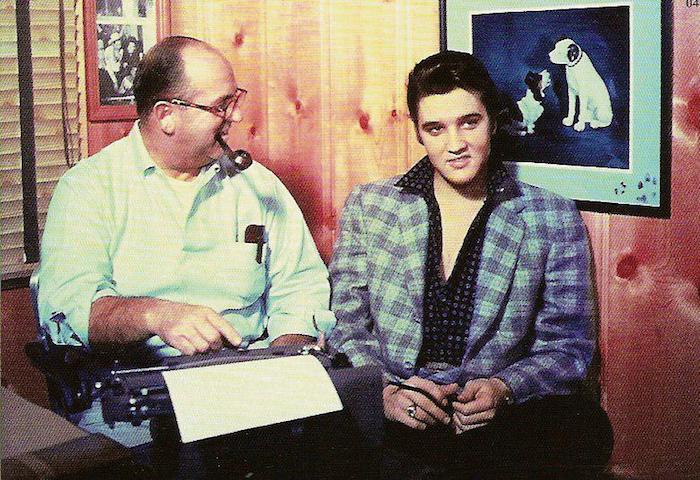
• Wallis believed Elvis needed to sing in movies
For his part, Hal Wallis never considered developing Elvis’ acting ability. “The idea of tailoring Elvis for dramatic roles is something that we never attempted,” he admitted years later. “We didn’t sign Elvis as a second James Dean. We signed him as a number-one Elvis Presley.” Even after Elvis showed dramatic potential in 1958’s King Creole, Wallis still didn’t believe he could carry a movie without music.
With both his manager and major producer unwilling to nurture the young Presley’s dramatic aspirations, it’s no wonder that the dream soon began to fade for Elvis as well. At a 1957 Vancouver B.C. press conference, soon after he had completed his third movie, Jailhouse Rock, Elvis was asked to rate himself as an actor. “Pretty bad,” he said. “I mean that’s something you learn through experience. I think that maybe I might accomplish something at it through the years.”
There were others in the industry who saw Elvis’ potential as an actor. After viewing Elvis’ screen test, Joe Hazen wrote a memo to his partner Wallis. “As a straight actor the guy has great potentialities,” Hazen noted. Later he added, “His dramatic abilities and talents should be carefully and steadily developed so ... he can do strong dramatic parts as well as sing.” Two directors of serious Presley films, Don Siegel (Flaming Star) and Philip Dunne (Wild in the Country), praised Elvis’ natural acting talent.
Unfortunately, though, the two men with their hands on the controls, Parker and Wallis, disagreed with them. Wallis wanted Elvis to sing, and sing often, in his Paramount pictures because he believed that’s what would draw hordes of young people into theaters. Parker wanted music in Elvis’ films for financial reasons. Soundtrack recordings led to lucrative RCA record releases, which, in turn, promoted the films.
• Elvis: “Okay, let’s make money”
When Elvis was disappointed to learn he was to sing four songs in Love Me Tender, a movie in which he had been led to believe he would have a straight dramatic role, Parker sat him down and asked him to make a choice. “Look,” explained the Colonel, “it’s pretty easy. We do it this way, we make money. We do it your way, we don’t make money.” It was an opportunity for Elvis to stand up for his dream of becoming a serious actor. Instead, he said, “Okay, let’s make money.” Elvis, it turned out, had another, stronger dream in 1956. He wanted to lift himself and his parents out of poverty, and that required money, a lot of it, in his eyes.
From that point on, Elvis put his Hollywood career completely in the hands of his manager. Lamar Fike, who joined Presley’s personal entourage in 1957 during the making of Jailhouse Rock, explained how little involvement Elvis had in the movie deals in the fifties. “Colonel would say, ‘Do you want to do it?’ Elvis would say, ‘Yeah.’ And then Colonel would go make the deal. The important thing is that Colonel had total freedom to make any deal he wanted. Elvis would say, ‘Take care of it. Bring me the paper, I’ll sign it.’ Elvis signed contracts blind. He didn’t know what they were. He just signed them. But Elvis signed too many contracts without looking at them. Then, too, early on, I don’t think the Colonel did anything to cause Elvis to distrust him.”
Elvis’ complete trust in the Colonel turned out to be a fatal flaw in his career. Elvis knew nothing about business and was not wise enough to surround himself with other advisers. He made his father, who probably knew less about business than Elvis, his business manager. And Vernon always counseled his son not to offend the Colonel. Most importantly, Elvis should have had a lawyer to advise him on contracts before signing them. (Joe Hazen noted, “If Elvis had a lawyer of his own, there would have been no Parker. No lawyer would’ve permitted Parker to take over a client like he did.”) Instead, Elvis put Colonel Parker in total control of his Hollywood career.
• A missed opportunity to change managers
A turning point occurred during the filming of Jailhouse Rock in 1957. Elvis had been grumbling aloud about the Colonel for a number of reasons. Parker wanted Scotty and Bill dismissed, he tried to keep Leiber and Stoller away from Elvis, and he said no to Elvis doing Robert Mitchum’s Thunder Road movie. Angered, the Colonel gathered his office staff together to witness a confrontation with Elvis. Alanna Nash described the fateful meeting as follows:
“Parker began in a voice husky with emotion. ‘I’m saying in front of all of these witnesses that if you don’t think I’ve done the right thing by you, you walk out this minute and you’re free. Go get yourself another manager. But if you stay, you’re going to do what I tell you. Do you understand me?’ Elvis nodded, resigned in the future to hold his tongue. ‘He got me this far, made me a big star,’ he told his pals. ‘I’m going to stick with him.’”
With a nod of his head that day, Elvis forever gave up control of his acting career, and sent it down the road to an uncertain future. Soon he would be in the army and his Hollywood career would fade away for two years. Meanwhile, Colonel Parker and Hal Wallis were making plans that, on one hand, would make Elvis a lot of money, but on the other hand, would put an end for good to his dream of being a serious actor. — Alan Hanson | © 2012
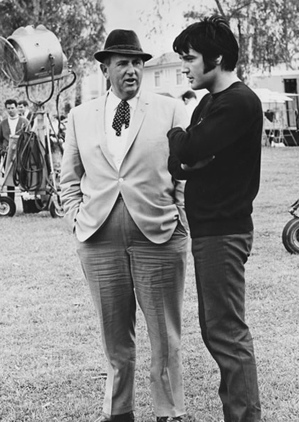
"Hal Wallis never considered developing Elvis’ acting ability. 'The idea of tailoring Elvis for dramatic roles is something that we never attempted,' he said years later."
